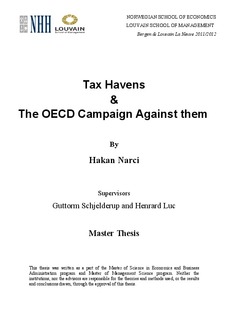Tax Havens and the OECD Campaign Against them
Master thesis
Permanent lenke
http://hdl.handle.net/11250/169643Utgivelsesdato
2012Metadata
Vis full innførselSamlinger
- Master Thesis [4372]
Sammendrag
There are two essential primary purposes for this thesis.
The first has been to highlight the phenomena Tax Havens with its economical impact on
other countries outlined in chapter two. Firstly the concept of tax havens is presented based
on the OECD definition. Secondly the secrecy legislation, regulation and the corporate
structures which tax havens offer to foreign investors and firms are given with their
significance for other states. Thirdly, the ways tax havens are used by foreign investors and
firms are given. This chapter ends by looking into the effects tax havens have on other
countries, in other words does the existence of havens matter to other countries? This chapter
concludes that existence of tax havens has led to more intensive competition among
countries for mobile capital, which seems to only benefit companies and investors and not
other countries where they lose their tax base and thus threatening the welfare state, while
the biggest damage seems to be the hindrance of the democratic process in developing
countries. In addition, havens’ tax system is discriminatory, since it favors only foreign
investors and companies compared to other countries. With the combination of secrecy rules
and regulations one could claim that tax havens do not compete on equal terms, this
represent a kind of competition which harms other countries economy.
The second primary purpose is to present the Organisation for Economic Co-operation and
Development (OECDs) campaign against Tax Havens. The main objective is to analyse the
campaigns major historical developments. To improve our analysis political theories has
been applied, to provide further explanation both for the existence of the OECDs campaign
and major historical developments. The idea is to provide knowledge for better be able to
understand the political power behind the developments and why. This part ends by
reflecting on what this account may forecast for the prospect for tax information exchange.
Multinational organizations such as the OECD are created to fundamentally promote the
interests of their member countries and eventually change their purpose in accordance with
changing collective interests. Jurisdictions such as tax havens that are forced to change their
actions will most likely comply only with the extent necessary to evade sanctions. Finally, in
the light of the new Global Forum on Transparency and Exchange of Information the future
of tax information exchange is evaluated and the effectiveness of Tax Information Exchange
Agreements is deliberated and the likelihood of mock compliance is assessed.
